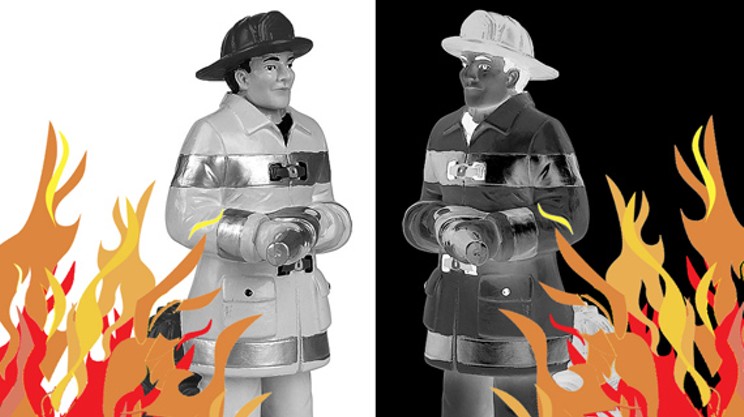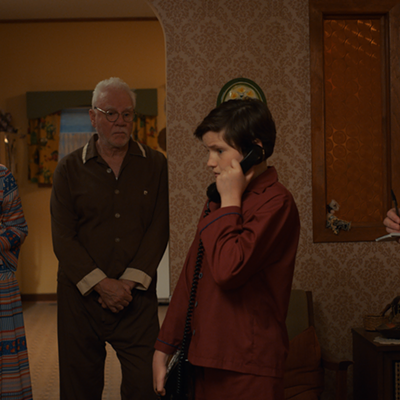A series of human rights complaints and questionable management decisions has plagued the Halifax fire department.
Last week we detailed allegations by black firefighters of institutional racism in the city's Fire and Emergency Services Department (see "Fired up," April 7, link below). This week, a woman firefighter goes public to say that she too is the victim of institutional discrimination by Fire Services.
Liane Tessier is a volunteer firefighter attempting to join the ranks of paid Halifax firefighters. She is also a medalist in the physically challenging World Firefighter Combat Challenge, having placed third in that international competition in 2007, and has a number of advanced firefighting certifications that allowed her to teach classes for the Halifax department.
"You name it, I pretty much have done it," she says of her firefighting accomplishments.
The short version of Tessier's complaint to the Human Rights Commission is that she was denied a job with the fire department only because of negative recommendations from two men she had already complained about.
While working as a volunteer firefighter at the Herring Cove station, Tessier explains, she faced increasing harassment from a pair of male firefighters at the station. She went through the normal internal complaint system within the Halifax department, sought help from Halifax's Employee Assistance Program and took a leave of absence.
As that grievance was slowly working its way through the process, she applied to become a full-time, paid firefighter with the department---the idea being she could work at any of the other HRM fire stations. She had far more than the required aptitudes and certifications, and easily passed the tests. She also had favourable letters of reference. But when it came time for a reference check from within the department, management turned to none other than one of the men she had filed a grievance against. The men, one of whom had in the meanwhile been promoted to captain at Herring Cove, recommended she not be hired.
The longer version of Tessier's complaint, detailed in documents and interviews, involves allegations of petty harassment building into an untenable work situation of malicious gossip and retribution.
Tessier cites what she calls the "Chebucto Head incident" as a turning point in her relationship with her male counterparts at the Herring Cove station.
She lives among a small cluster of modest houses on a wind-swept barren outcrop that overlooks the ocean near Herring Cove. A private road with "no trespassing" signs leads to the property, where there is a small pond. After talking with her neighbours and agreeing upon the most convenient time for all, Tessier arranged for the pond to be used for a volunteer training session in the use of pumps. That event was successful, she says.
Some weeks later, however, Tessier says the volunteers and their equipment, including several engines, showed up on the road unannounced and without prior permission to again use the pond. She was at home at the time, ran out to the road and confronted the men. Words were exchanged, but she felt that was the end of it.
"They turned it into me being insubordinate," she says. "I had raised my voice."
After that event, the harassment was ratcheted up into open hostility, she says, and that's when she filed her complaint with the city's human resources department, ultimately leading to her wider complaint with the human rights commission.
The black firefighters' complaint lists dozens of incidents since the creation of the department in 1996, ranging from loose use of racial epithets among a small number of employees to systematic discrimination against a class of black recruits to the arbitrary and improper use of test standards and pay scales for black firefighters. Department management, say the signers of the complaint, either ignored their complaints or took inadequate action to seriously address the issues.
Although it was signed by nine firefighters, chief Bill Mosher told reporters that the complaint was the work of just two overreacting black firefighters who took the incidents "out of context."
Editor's note: The following was issued by The Coast on April 13, 2010.
APOLOGY
On April 16, 2009, The Coast posted an article on our website entitled "HFD's old boy network." As with all of our stories, readers were invited to comment on the article. Unfortunately, several readers took this opportunity to write defamatory comments about Halifax Regional Municipality Fire Services Chief Bill Mosher and Deputy Chief Steve Thurber.
These comments were completely unsubstantiated and have harmed the reputations of Chief Mosher and Deputy Chief Thurber. The Coast sincerely apologizes to Chief Mosher and Deputy Chief Thurber for the damage to their reputations and the pain and suffering they have endured as a result of the defamatory comments which The Coast permitted to be posted on its website.
The postings have been removed from our website. As a consequence of the abuse of our comments policy, further comment posting in respect to this story will not be accepted.


















